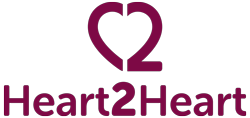When Your Baby Has a Potential Heart Condition
Download this Information sheet as a PDF
This information sheet explains what happens if a potential problem has been detected with your baby’s heart and outlines what you can expect to happen next.
What is your baby’s heart check at birth for?
After your baby is born they should receive a range of examinations by a health professional to check for any possible medical conditions – ensuring they are detected early. Sometimes during the course of one of these examinations a medical professional may observe something unusual with your child’s heart or may suspect a problem.
Common symptoms which may indicate a problem include:
- A blueish tint to the skin
- Collapse or falling asleep during feeds
- Another common indicator of a possible heart condition a medical professional may detect is a heart murmur.
What is a heart murmur?
As blood is pumped through the heart it will create a certain sound, a murmur is simply an ‘extra or unusual’ sound. The extra sound is caused by tiny disruptions in the ‘normal’ blood-flow. There are two sorts of heart murmur; innocent and abnormal. Innocent heart murmurs are quite common in children and are no cause for concern; they are not an indicator of a heart condition. An abnormal murmur is an indication of some sort of condition which may require treatment.
Murmurs are detected by listening to heart sounds through a stethoscope, so it will be impossible for a clinician to discern whether or not a murmur is innocent or abnormal without additional tests. It should be noted that a murmur is not a heart condition itself; merely a possible indicator of one.
What can you expect to happen next?
A more senior and experienced clinician will examine your baby next to further investigate these possible issues. Your child may be referred to a specialist or sent for further tests, initially it’s usual to carry out an ECHO (Echocardiogram).
Many parents worry during this time, but only a small number of babies are born with congenital heart defects (between 0.4% and 0.9%) which require treatment each year; so it usually turns out that there was no need to worry.
What is an Echocardiogram (ECHO)?
An echocardiogram is an ultrasound test which scans to see how the blood is moving through the heart and the structure of the heart. This is a special image of the heart which shows all the chambers and working of the heart allowing the medical professional to look at the heart in detail. This scan will help them to see if there are any possible problems. The test is not invasive so your baby will not experience any discomfort or be at any risk from the test itself.
What should I do in the meantime?
You should receive a full explanation of the reason and timescale of the referral to a specialist. While you are waiting for further tests, you should feel able to contact your Health Visitor, GP and other medical professionals. If you have any concerns or questions do not hesitate to visit A&E or call 999 if your child suffers a sudden, dramatic or worrying change in their health.
Five signs which might indicate an underlying heart problem:
Heart, rate being too fast or too slow (normal range 100-160 beats per minute)
Energy, the child may be sleepy, quiet or falls asleep during feeds;
Appearance, the child may be pale, blue or dusky grey in colour;
Respiration, the child may be breathing too fast or too slow (normally 40-60 breaths per minute);
Temperature, the child may be cold to the touch, particularly hands and feet.
If your child has some of these symptoms you should tell your medical professional e.g. Health Visitor or GP as soon as possible. If you are unable to contact your health professional, then do err on the side of caution and go to A&E or call 999.
Things to remember
While professionals try to ensure you’ve understood what’s happening, we’d recommend that you keep a list of all your questions and concerns as you think of them; so that during your next appointment you don’t forget anything you wanted to raise. It’s also a good idea to record what was said so you can remember it later; including dates, names, medical terminology and next actions.
Where can I go for more information or support?
If you have any more questions, want more information or want to talk through what has happened while you wait for your follow up appointment, or afterwards; you can contact The Children’s Heart Federation. CHF is the UK’s leading children’s heart charity and is available for support or further information.
Evidence and sources of information for this CHF information sheet can be obtained at:
(1) National Institute for Health & Care Excellence. Structural heart defects overview. London: NICE; 2017. Available at:
https://pathways.nice.org.uk/pathways/structural-heart-defects
(2) NHS Choices. Information about congenital heart disease. London: NHS; 2017. Available at:
https://www.nhs.uk/conditions/Congenital-heart-disease/
About this document:
Published: February 2013
Reviewed: May 2022
To inform CHF of a comment or suggestion, please contact us via info@chfed.org.uk or Tel: 0300 561 0065.









